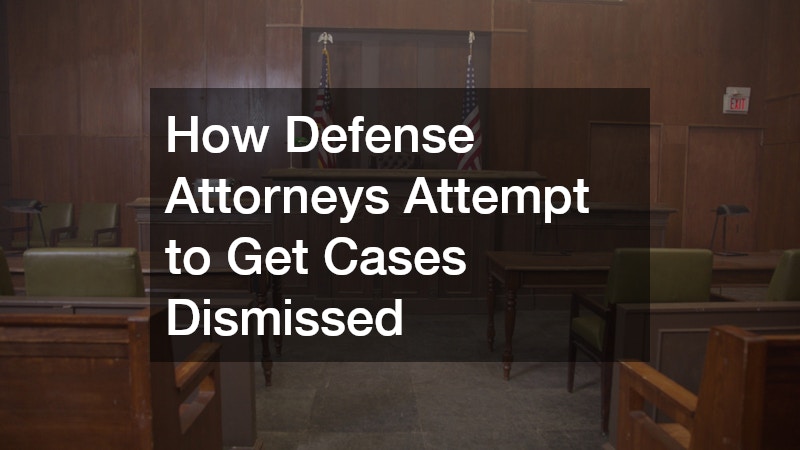How Defense Attorneys Attempt to Get Cases Dismissed


Criminal defense attorneys play a crucial role in the justice system by representing individuals accused of crimes. Their main objective is to provide a robust defense to ensure the rights of the accused are protected throughout the legal process. These legal professionals possess extensive knowledge of criminal law, courtroom procedures, and the rights guaranteed to offenders under the Constitution.
One of the fundamental rights of accused individuals is the right to a fair trial, and attorneys are tasked with guaranteeing this right. Part of their job is identifying potential weaknesses in the prosecution’s case, sometimes leading to the dismissal of charges. This is no small feat, requiring a deep understanding of legal strategies and a meticulous review of all case details.
The competence of a criminal defense attorney can significantly influence the outcome of a case. A successful defense not only protects the accused from unwarranted punishment but also upholds the integrity of the legal system. Thus, these attorneys must be adept at identifying procedural errors, gathering exculpatory evidence, and challenging the prosecution’s case at every possible turn.
Challenging the Prosecution’s Evidence
One common strategy defense attorneys use to secure a dismissal is challenging the evidence presented by the prosecution. This might involve questioning the validity or legality of how the evidence was obtained, such as whether there was a proper search warrant or if there was any violation of the Fourth Amendment rights. By demonstrating that the evidence was improperly obtained, attorneys can argue for its exclusion from the trial, which can severely weaken the prosecution’s case.
An attorney may also challenge the reliability of evidence, such as questioning the chain of custody or pointing out inconsistencies in the evidence that might render it inadmissible. If the primary evidence against the accused is proven unreliable or inadmissible, there might not be enough remaining to support the charges, leading to a potential dismissal of the case. This is a critical tactic, requiring skill and dedication to effectively examine every piece of evidence and its corresponding legality.
Moreover, defense attorneys can call into question the credibility of witnesses or experts, which can further undermine the prosecution’s case. This involves meticulous cross-examination to expose any biases, inconsistencies, or inaccuracies in witness testimonies. Successfully discrediting key witnesses can sometimes be the linchpin in obtaining a case dismissal, as it directly impacts the strength of the prosecution’s argument.
Exposing Procedural Errors and Violations
Another path to dismissal pursued by criminal defense attorneys involves identifying procedural mistakes made by law enforcement or during the trial process. This can range from errors in arrest procedures to violations of the defendant’s right to a speedy trial. Defense lawyers are adept at scrutinizing every aspect of the legal process to uncover such errors.
Procedural errors can occur at any stage, from arrest to trial, and if such errors infringe on the defendant’s rights, it may provide grounds for dismissal. For instance, if a suspect was not read their Miranda rights, any confession obtained could be inadmissible. Similarly, delays that infringe on a defendant’s Sixth Amendment rights might also be grounds for case dismissal.
Defense attorneys often file motions to dismiss on these grounds, presenting evidence of violations to the court. The effectiveness of this strategy relies heavily on the ability of the defense to spot even minor infractions that could significantly impact trial fairness. This highlights the importance of having meticulous and vigilant defense attorneys who are dedicated to scrutinizing every detail for potential missteps.
Negotiating Plea Bargains and Lesser Charges
While securing a case dismissal is ideal, criminal defense attorneys also work to negotiate plea bargains or reduced charges when dismissal is not feasible. This strategic negotiation takes into account the strengths and weaknesses of both the defense and prosecution’s cases. Attorneys must possess strong negotiation skills to advocate effectively for their clients.
Plea bargains often provide a safer resolution to a case compared to the unpredictability of trial outcomes. Defense attorneys present compelling arguments and evidence to convince prosecutors or judges that a lesser charge or penalty is warranted. By negotiating favorable terms, defense attorneys can shield clients from the harsher repercussions of more severe charges.
These negotiations require a deep understanding of the criminal justice system and the ability to anticipate the prosecution’s moves. Successful plea bargaining involves finding a balance between protecting the client’s rights and reaching an agreeable compromise with the opposing side. This rigorous negotiation process underscores the multifaceted role of a criminal defense attorney in seeking justice and fair representation for their clients.



